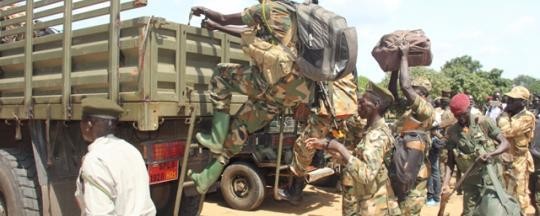South Sudan’s government has yet to take the first step toward demilitarizing Juba – a key plank of the peace deal – because it has not yet declared how many soldiers it has in the capital city, international ceasefire monitors said Wednesday.
The government is meant to withdraw its forces in Juba to 25 km outside the capital city in preparation for the retun of appointed vice president and rebel leader Riek Machar. In recent months, the government has repeatedly said it is complying by identifying cantonment sites and by moving some soldiers outside the city.
But on Wednesday international monitors from the Ceasefire and Transitional Security Arrangements Monitoring Mechanism (CTSAMM) said in fact the government has yet to begin the demilitarization process since it has not announced how many forces and weapons it has in Juba.
“For the security arrangements of Juba to be put in place this needs to happen, this is the first step,” said Ruth Feeney, CTSAMM communications officer, at a press conference. “We have made the request over the last month or so and the information has not been forthcoming.”
Feeney said CTSAMM will not be able to confirm if the government is keeping its forces in cantonment outside Juba if they don’t know how many forces were in Juba originally.
“For us to verify that the forces have deployed 25 km outside of Juba we need to know how many were in Juba in the first place,” she said. “Before we go out and count all the people, all the soldiers in the cantonments, we need to know how many were here, so we need formal notification from the parties of this. They need to declare their forces, their weaponry, etc.”
Feeney said the CTSAMM in its meeting Wednesday again urged the government to delcare their forces and were assured that they would receive the information. However, she said there is no deadline set for the declaration of forces.
“We didn’t give them a time frame, but as soon as tomorrow [they can declare]. We have our liaison officers. We can say, ‘what are you doing about this?’ and ‘let’s move this forward.’ We have a close working relationship with both the parties,” she said.
Ceasefire monitors restricted ‘every day’
Feeney further noted that the CTSAMM investigating teams around the country continue to face daily obstructions from both sides because commanders on the ground delay by asking for permission from higher-ups to allow teams to access sites of alleged conflict.
“Every day [our monitoring and verification teams] face restrictions on the freedom of movement,” she said. She said the parties must be flexible enough to allow the CTSAMM teams to access sites of alleged violations by the next day or couple of days maximum.
Feeney said CSTAMM’s work is also made difficult because soldiers on either side are not remaining in their cantonment zones, particularly in Western Equatoria. Feeney said this makes it hard for CTSAMM to identify who is responsible for various violations as there are multiple unknown armed groups roaming the area as well.
Five violations in last three months
Meanwhile, the CTSAMM spokesperson said investigators have verified five different violations of the ceasefire committed by both parties between 28 December and early March committed by both parties. She said the violations took place in Upper Nile, Unity, Western Bahr el Ghazal, and Western Equatoria states, with two violations taking place in Western Equatoria.
Feeney declined to give further details of the five incidents but said the Joint Monitoring and Evaluation Commission will release the information publicly soon.
She said CTSAMM is still investigating the attack on the UN base in Malakal last month.




